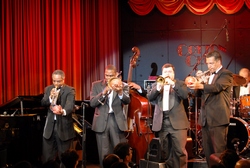|
|
|
|
|
|
|
Duke Ellington Orchestra (USA)
|
|
|
April 09, 19:00
The State Kremlin Palace 
 Duke Ellington was the most important composer in the history of jazz as well as being a bandleader who held his large group together continuously for almost 50 years. The two aspects of his career were related; Ellington used his band as a musical laboratory for his new compositions and shaped his writing specifically to showcase the talents of his band members, many of whom remained with him for long periods. Ellington also wrote film scores and stage musicals, and several of his instrumental works were adapted into songs that became standards. In addition to touring year in and year out, he recorded extensively, resulting in a gigantic body of work that was still being assessed a quarter century after his death. President Lyndon Johnson presented Duke Ellingtonwith the President’s Gold Medal in 1966. President Richard M Nixon presented Duke Ellington with the Medal of Freedom in 1969. Duke Ellington received 13 Grammy Awards and the Pulitzer Prize.
Duke Ellington was the most important composer in the history of jazz as well as being a bandleader who held his large group together continuously for almost 50 years. The two aspects of his career were related; Ellington used his band as a musical laboratory for his new compositions and shaped his writing specifically to showcase the talents of his band members, many of whom remained with him for long periods. Ellington also wrote film scores and stage musicals, and several of his instrumental works were adapted into songs that became standards. In addition to touring year in and year out, he recorded extensively, resulting in a gigantic body of work that was still being assessed a quarter century after his death. President Lyndon Johnson presented Duke Ellingtonwith the President’s Gold Medal in 1966. President Richard M Nixon presented Duke Ellington with the Medal of Freedom in 1969. Duke Ellington received 13 Grammy Awards and the Pulitzer Prize.
Duke Ellington influenced millions of people both around the world and at home. He gave American music its own sound for the first time. In his fifty year career, he played over 20,000 performances in Europe, Latin America, the Middle East as well as Asia.
Simply put, Ellington transcends boundaries and fills the world with a treasure trove of music that renews itself through every generation of fans and music-lovers. His legacy continues to live on and will endure for generations to come. Winton Marsalis said it best when he said "His music sounds like America." Because of the unmatched artistic heights to which he soared, no one deserved the phrase “beyond category” more than Ellington, for it aptly describes his life as well. He was most certainly one of a kind that maintained a llifestyle with universal appeal which transcended countless boundaries.
Duke Ellington is best remembered for the over 3000 songs that he composed during his lifetime. His best known titles include; "It Don't Mean a Thing if It Ain't Got That Swing", "Sophisticated Lady", "Mood Indigo", “Solitude", "In a Mellotone", and "Satin Doll". The most amazing part about Ellington was the most creative while he was on the road. It was during this time when he wrote his most famous piece, "Mood Indigo"which brought him world wide fame.
When asked what inspired him to write, Ellington replied, "My men and my race are the inspiration of my work. I try to catch the character and mood and feeling of my people". Duke Ellington's popular compositions set the bar for generations of brilliant jazz, pop, theatre and soundtrack composers to come. While these compositions guarantee his greatness, what makes Duke an iconoclastic genius, and an unparalleled visionary, what has granted him immortality are his extended suites. From 1943's Black, Brown and Beige to 1972's The Uwis Suite, Duke used the suite format to give his jazz songs a far more empowering meaning, resonance and purpose: to exalt, mythologize and re-contextualize the African-American experience on a grand scale.
Duke Ellington and his Orchestra is perhaps the greatest of all jazz bands. The group stayed together for over fifty years and recorded and wrote some of America's greatest music. The band started in New York City under name of the Washingtonians in 1923, they then briefly became known as Duke Ellington and his Kentucky Club Orchestra, then as Duke Ellington and his Cotton Club Orchestra from 1927 to 1930.
It was through weekly radio broadcasts from the Cotton Club that the orchestra gained nationwide exposure and became famous. After 1931 the band was billed as Duke Ellington and his Orchestra. Duke Ellington led his Orchestra from 1923 until his death in 1974. His death did not end the band, which was taken over by his son Mercer, who led it until his own death in 1996. Paul Ellington, Mercer's youngest son, took over the Orchestra from there.
Find out more about Duke Ellington and his Orchestra.
|
|
|
|
|